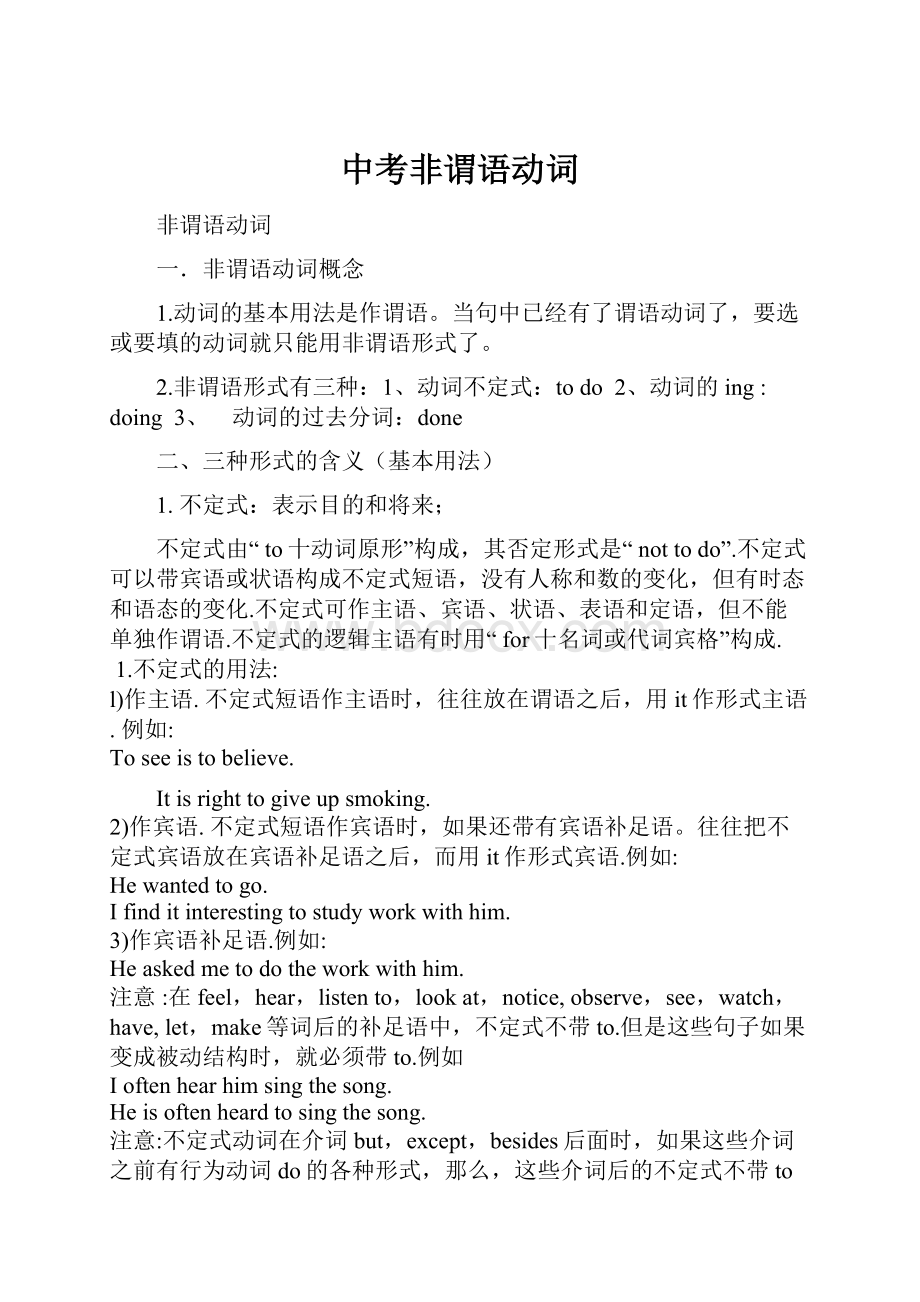中考非谓语动词.docx
《中考非谓语动词.docx》由会员分享,可在线阅读,更多相关《中考非谓语动词.docx(11页珍藏版)》请在冰豆网上搜索。

中考非谓语动词
非谓语动词
一.非谓语动词概念
1.动词的基本用法是作谓语。
当句中已经有了谓语动词了,要选或要填的动词就只能用非谓语形式了。
2.非谓语形式有三种:
1、动词不定式:
todo 2、动词的ing:
doing 3、 动词的过去分词:
done
二、三种形式的含义(基本用法)
1.不定式:
表示目的和将来;
不定式由“to十动词原形”构成,其否定形式是“nottodo”.不定式可以带宾语或状语构成不定式短语,没有人称和数的变化,但有时态和语态的变化.不定式可作主语、宾语、状语、表语和定语,但不能单独作谓语.不定式的逻辑主语有时用“for十名词或代词宾格”构成.
1.不定式的用法:
l)作主语.不定式短语作主语时,往往放在谓语之后,用it作形式主语.例如:
Toseeistobelieve.
Itisrighttogiveupsmoking.
2)作宾语.不定式短语作宾语时,如果还带有宾语补足语。
往往把不定式宾语放在宾语补足语之后,而用it作形式宾语.例如:
Hewantedtogo.
Ifinditinterestingtostudyworkwithhim.
3)作宾语补足语.例如:
Heaskedmetodotheworkwithhim.
注意:
在feel,hear,listento,lookat,notice,observe,see,watch,have,let,make等词后的补足语中,不定式不带to.但是这些句子如果变成被动结构时,就必须带to.例如
Ioftenhearhimsingthesong.
Heisoftenheardtosingthesong.
注意:
不定式动词在介词but,except,besides后面时,如果这些介词之前有行为动词do的各种形式,那么,这些介词后的不定式不带to,否则要带to.如:
Shecoulddonothingbutcry.
Whatdoyouliketodobesidesswim?
Ihavenochoicebuttogo.
4)作定语.例如:
Ihavesomebooksforyoutoread.
注①作定语的不定式如果是不及物动词,或者不定式所修饰的名词或代词是不定式动作的地点、工具等,不定式后面须有相应的介词.例如:
Heislookingforaroomtolivein.
Thereisnothingtoworryabout.
Pleasegivemeaknifetocutwith.
但是,不定式所修饰的名词如果是time,place或way,不定式后面的介词习惯上要省去.例如:
Hehadnomoneyandnoplacetolive.
5)作状语,表示目的、原因、结果或条件.例如:
Icameheretoseeyou.(目的)
Wewereveryexcitedtohearthenews.(原因)
Hehurriedtotheschooltofindnobodythere.(结果)
Tolookathim,youwouldlikehim.(条件)
目的状语还可以用inorderto或soasto来表示.如:
Inordertopasstheexam,heworkedveryhard.
Weranallthewaysoasnottobelate.
不定式也可在作表语用的形容词后面作状语.例如:
Iamverygladtohearit.
Thequestionisdifficulttoanswer.
“too十形容词或副词十不定式”作状语.例如:
Heistoooldtodothat.
另外句子中有enough这个词时,常用不定式作状语.例如:
Theroomisbigenoughtoholdus.
6)作表语.例如:
Myjobistohelpthepatient.
7)作独立成分.例如:
Totellthetruth,Idon’tagreewithyou.
8)不定式与疑问词who,which,when,where,how,what等连用,在句中起名词作用,可充当主语、表语、宾语等.例如:
Hedidn’tknowwhattosay.(宾语)
Howtosolvetheproblemisveryimportant.(主语)
Myquestioniswhentostart.(表语)
注意:
在与why连用时,只用于why或whynot开头的简短疑问句中,后面紧跟的动词不定式不带to.例如:
Whynothavearest?
2.动词的ing:
表示主动和进行
1.动名词由动词+ing构成;具有动词和名词的性质;在句中起名词作用,可作主语、宾语、表语和定语.
1)作主语.例如:
Seeingisbelieving.
Layingeggsistheantqueen’sfull-timejob.
Itisnousearguingwithhim.
2)作表语.例如:
Herjobisteaching.
3)作宾语.例如:
Heisfondofplayingfootball.
Ilikeswimming.
注①admit,appreciate,avoid,consider,delay,dislike,enjoy,escape,excuse,face,feel.like,finish,forgive,giveup,imagine,include,keep,mention,mind,miss,practise,putoff,resist,risk,suggest,can’thelp,can’tstand(无法忍受)等动词后可以用动名词作宾语,但不能用不定式.
注②forget,goon,like,mean,regret,remember,stop,try等动词可带动名词或不定式作宾语,但意义上有区别。
Irememberdoingtheexercise.(我记得做过练习.)
Imustremembertodoit.(我必须记着做这事.)
Itriednottogothere.(我没法不去那里.)
Itrieddoingitagain.(我试着又干了一次.)
Stopspeaking.(不要讲话)
Hestoppedtotalk.(他停下来讲话.)
Imeantocomeearlytoday.(我打算今早些来.)
Missingthetrainmeanswaitingforanotherhour.(误了这趟火车意味着再等一个小时.)
注③在allow,advise,forbid,permit等动词后直接跟动词作宾语时,要用动名词形式,如果后面有名词或代词作宾语,然后再跟动词作宾语补足语时,其宾语补足语用带to的不定式.例如:
Wedon’tallowsmokinghere.
Wedon'tallowstudentstosmoke.
注④动词need,require,want作“需要”解,其后跟动词作它的宾语时,必须用动名词,或不定式的被动式.这时,动名词的主动式表示被动意义.例如:
Thewindowneeds(requires,wants)cleaning(tobecleaned)
注⑤在短语devoteto,lookforwardto,stickto,tobeusedto,objectto,thankyoufor,excusemefor,be(kept)busy,beworth,havedifficulty/trouble/problem(in),haveagood/wonderful/hardtime(in),there’snouse/good/need,feel/look/seem/like/getdownto等后的动词也必须用动名词形式.例如:
Ilookforwardtohearingfromyousoon.
注⑥在love,hate,prefer等动词后用动名词或不定式无多大区别。
但说话人有所指的时候,通常用不定式。
注⑦start,begin,continue在书面语中多后接动名词,在口语中多后接不定式。
注⑧在should(would)like/love等后须用不定式。
4)作定语.例如:
Hehasareadingroom.
3.过去分词:
表示被动和完成。
1.分词的时态和语态
l)分词分为现在分词和过去分词。
现在分词有一般式和完成式.一般式表示和谓语动词所表示的动作同时发生的行为;完成式(having十过去分词)表示在谓语动词所表示的动作之前发生的动作.例如:
Beingastudent,hewasinterestedinbooks.
Havingstudiedintheuniversityfor3years,heknowsthewayverywell.
过去分词表示在谓语动词之前发生的动作,本身有被动的含义,所以只有一般式没有完成式.
2.分词的用法
l)作定语
分词短语做定语时,放在被修饰的名词之后;单个分词做定语时,放在被修饰的名词之前.例如:
Themanstandingbythewindowisourteacher.
Theexcitedpeoplerushedintothebuilding.
注意:
现在分词作定语时,它表示的动作是正在进行或与谓语动词所表示的动作几乎同时发生,如果两个动作有先有后,一般不能用现在分词作定语,而要用定语从句。
例如:
Theteachercriticizedthestudentwhohadbrokenthewindow.
2)作状语
分词或分词短语作状语时,可以表示时间、原因、行为方式、伴随状况等。
例如:
Beingastudent,Imuststudyhard.(原因)
Whilereadingthebook,henoddedfromtimetotime.(时间)
Theteacherstoodtheresurroundedbythestudents.(方式)
注:
①分词短语作状语时,其逻辑主语必须与句子的主语一致.
注:
②表示时间关系的分词短语有时可由连接词while或when引出.
3)作表语.例如:
Thenewsisinspiring.
Theglassisbroken.
4)作宾语补足语.例如:
Wesawtheteachermakingtheexperiment.
注意:
在see,hear,watch,feel,observe,have,listento,notice等动词后,既可以用现在分词构成复合宾语,也可以用不定式构成复合宾语,但两者的含义是有差别的,用现在分词,表示动作正在发生,(即处于发生的过程中,还没有结束),用不定式表示动作发生了,(即动作全过程结束了)。
例如:
Isawthegirlgettingonthetractor.
Isawthegirlgetonthetractoranddriveoff.
Hehadhisclotheswashed.(他叫别人洗了衣服)
Wehadthefireburningallday.(我们使火燃烧了一整天)。
注意:
“have十宾语十现在分词”表示主体使客体处于某状态或干什么事;“have十宾语十过去分词”表示动作是别人做的或与主体意志无关.
练习:
()1.Shereachedthetopofthehillandstopped_______onabigrock.
A.tohaverestedB.restingC.torestD.rest
()2.Doyouknowtheboy_______underthebigtree?
A.layB.lainC.layingD.lying
()3.You’dbetter______yourbike_____atonce.ItisMondaytomorrow,youknow.
A.tohave,mendB.have,mendedC.have,tomendD.tohave,mended
()4.---Look!
Thelightsintheclassroomarestillon.
---Oh,Iforgot_______.
A.turningthemoffB.turnthemoff
C.toturnthemoffD.havingturnedthemoff
()5.“Can’tyouread?
”theofficersaid_______tothenotice.
A.angrilypointingB.andpointangrilyC.angrilypointedD.pointangrily
()6.Thecomputercenter,_______lastyear,isverypopularamongthestudentsinthisschool.
A.openB.openingC.havingopenedD.opened
()7.Thepolicemanwarnedtheyoungman_______afterdrinking.
A.nevertodriveB.toneverdriveC.neverdrivingD.neverdrive
()8.---What’sthelanguage_______inNewZealand?
---English.
A.speakingB.spokenC.bespokenD.tospeak
()9.Hedidn’tfeellike_______outforawalk,becausehehadcaughtacold.
A.togoB.goesC.goneD.going
()10.Pauldoesn’thavetobemade_______.Healwaysworkshard.
A.learnB.tolearnC.learnedD.learning
()11.Thehouseisnotbigenoughforusall_______.
A.toliveinB.tobelivedinC.toliveD.forlivingin
()12.Aclockismadefor_______usthetime.
A.tellB.tellingC.totellD.tells
()13.You’dbetter_______athomeallthetime.It’sbadforyourhealth.
A.don’tstayB.notostayC.notstayD.notstaying
()14.Thestudentsarebusy_______readyfortheexamnow.
A.gettingB.geC.gotD.toget
()15.Themotheraskedtheboy_______downtheladder,buthewenton_______instead.
A.come;climbingB.tocome;toclimb
C.tocome;climbingD.coming;climbing
()16.Isthereanytime_______tothemuseum?
A.goingB.togoC.goesD.gone
()17.Theteacheraskedthestudentstoclosethewindows_______thewindfrom_______thepapersaway.
A.tostop;blowingB.stopping;blowingC.tostop;blowD.stopped;blow
()18.Abirdwasseen_______intotheclassroomyesterday.
A.flewB.toflyC.flyD.wasflying
()19.Weshoulddoasmuchaswecan_______water.
A.forsavingB.tosaveC.saveD.saved
()20.Therearemanypeople_______tobuycarsinthemodernworld.
A.wantB.wantedC.wantingD.towant
()21.---I’mtoobusy_______tomyfamily.
---Whynotcalltheminstead?
A.writingB.towriteC.writtenD.write
()22.Thelittleboywokeuphisfather,_______“HappyBirthday!
”
A.callB.tocallC.calledD.calling
()23.Thecar_______inGermanyinthe1960slooksoldnow.
A.producedB.producingC.toproduceD.whichproduced
()24.---Whatareonshowinthemuseum?
---Somepictures_______bytheAfricans.
A.drawingB.drawnC.drewD.weredrawn
()25.Thesickmanstayedinbed,_______veryterrible.
A.feltB.feelingC.isfeelingD.wasfeeling
()26.---Theboywasseen_______hisbikeamomentago.
---Iamsorrytohearthat.
A.felloffB.tofalloffC.falloffD.tofalldown
()27.There’resomanybeautifulpresentsintheshopthatIdon’tknow_______.
A.tochoosewhichoneB.whatchoose
C.whichonetochooseD.tochoosewhat
()28.---Howbad!
Theystillhavenoideashow_______theproblem.
---Let’sgotohelpthem.
A.solvingB.solvedC.tosolveD.solves
()29.Whatisthebestwaydoyouthink______thewildanimals?
A.protectingB.toprotectingC.protectedD.toprotect
()30.---You’dbetterhaveyoursportsjacket_____.It’stoodirty.
---Thanks.Iwill.
A.towashB.washedC.washingD.wash
()31.---Thelittleboywasmade_______Englishforanotherhour.
---Poorboy!
A.readB.readingC.readsD.toread
()32.Ithinkitkind_______.
A.ofhimtohelpmeB.forhimtohelp
C.thathehelpmeD.ofhimhelpingme
()33.It’stoohottoday.Whynot_______yourcoat?
A.takeonB.totakeoffC.takeoffD.takingoff
()34.Boys,don’tforget_____thewindowsbeforeyouleavetheclassroom.
A.closingB.closedC.toclosingD.toclose
()35.Hemadeit_______forpeople______thecomputersbyinventingnewsoftware.
A.easy,useB.easy,usingC.easily,touseD.easier,touse
()36.Alloftheplansareverygood.Ireallydon’tknow_______.
A.whichtotalkB.whichtotalkabout
C.